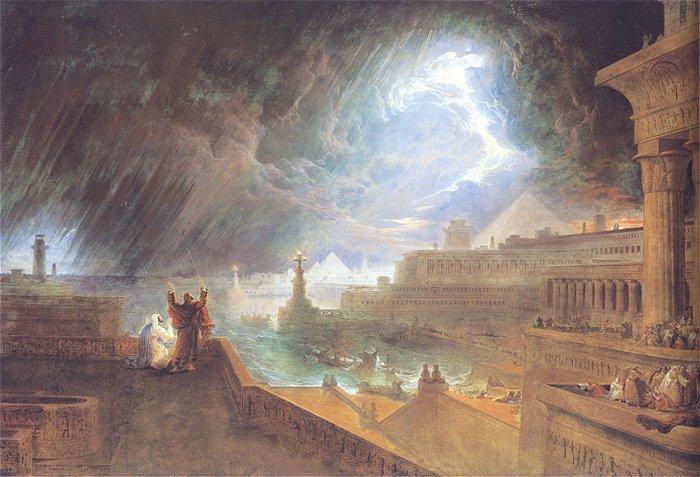
The Seventh Plague: John Martin’s painting of the plague of hail and fire (1823)
“Then the Lord said to Moses and Aaron, When Pharaoh says to you, ‘Prove yourselves by working a miracle,’ then you shall say to Aaron, ‘Take your staff and cast it down before Pharaoh, that it may become a serpent.'” So Moses and Aaron went to Pharaoh and did just as the Lord commanded. Aaron cast down his staff before Pharaoh and his servants, and it became a serpent. Then Pharaoh summoned the wise men, and the sorcerers, and they, the magicians of Egypt, also did the same by their secret arts. For each man cast down his staff, and they became serpents. But Aaron’s staff swallowed up their staffs. Still, Pharaoh’s heart was hardened, and he would not listen to them, as the Lord had said.” (Exodus 7: 8-13)
A consistent, though rarely dealt with, theme throughout the Pentateuch is that, for the sake of redemption, God gets His hands dirty.
The Hebrew scholars tell me that the word used for ‘serpent’ in this passage is tannin, which is interesting because it differs from the word nachash used in Exodus 4:2-5 when God initially explains the signs to Moses. The significance lies in the connotations that each of the terms carry. Nachash is the term used in Genesis 3:1 in reference to the serpent in the Garden of Eden. Tannin, on the other hand, was more commonly used in reference to the sea monsters that pervaded ancient Canaanite, Phoenician, and Hebrew mythology. More specifically, the sea dwelling tannin were (generally) understood as the creaturely personification of chaos and evil.
Aaron’s staff is turned into a serpent (tannin), a feat that is then copied by Pharaoh’s magicians, and the serpent (tannin) that God produced out of Aaron’s staff devours the serpent (tannin) produced by the magicians. If the tannin described in this passage elsewhere refers almost universally to the anti-creational forces of chaos that oppose the rule of God, then it’s unlikely that the passage at hand is an exception. The initial showdown described in Exodus 7:8-13 is not, theologian Peter Enns has pointed out, merely a showdown between Pharaoh and Moses/Aaron. Nor is it a showdown between Pharaoh and Israel. At one level, it is a showdown between Pharaoh and Yahweh. But even that is too myopic a reading. What we witness in this passage is foreshadowing of the drama that will ensue throughout the rest of the Pentateuch, and the rest of the Biblical narrative as a whole: the Creator of the universe overcomes the chaotic forces of darkness (tannin) that have usurped the world on their own terms. He will overcome tannin, sometimes, inevitably, by employing tannin.
God is not Deistically removed from the plight of creation, looking down in stoic disapproval at the mess we’ve made; He is Theistically active in the redemption of creation, to the point that He will work within the bounds of the fallenness of the world to rescue it. Hence, God will spill blood in the process of bringing about the end of blood-spilling. God will bring about an end to human violence, sometimes, inevitably, through Divine violence. Throughout the scriptures, and especially the Old Testament, God wears the warrior hat, not because He is fond of violence, but because He is bringing about its end. In the pages of the Torah we watch Yahweh crush a thousand Pharaohs in order that one day the may never be another Lamech. (Gen. 4:23-24)
That is why the satisfied God, who created all things to share in His own satisfaction, will enact plagues on Egypt (Ex. 7:14-11:10, 12:29-32): in order to further His redemptive operation. It is true that Egypt was met with the consequences of their communal oppression of the Israelites. But at a more foundational level, God’s act of vengeance on Egypt was driven by His love for the world – a love that moved Him to get His hands dirty. I’m about to cross the line with some people’s patience here: this is why the same God revealed in Jesus Christ (Col. 1:15; John 1:18; Heb. 1:3), the God who is Love (1 John 4:8,16), ordered the slaughtering of the Canaanites and others (Deut. 20:17; Josh. 6:21). This is why the God who “desires that all would repent and be saved” (1 Tim. 2:4; 2 Pet. 3:9) would harden the heart of Pharaoh and bring him to his knees (Ex. 11:8-10).
The horrific violence performed and sanctioned by God throughout the biblical narrative, far from being a break from character, emanates from His own faithfulness to His promise to bring about redemption to a sin-shattered world. It is, in fact, a deeper, warmer love than is intelligible to us that prevents Yahweh from being deterred from His project of reconciling the world to Himself by His own innate desire to preserve the lives of those who would prevent Him. In the endeavor to bring about a kingdom that operates on love, He cannot tolerate those who persist in hate. What the story of the Torah teaches us, amongst other things, is that God so loved the world that He was willing to work within the bounds of its fallenness to rescue it.
Reblogged this on Ryan Ellington.
LikeLike